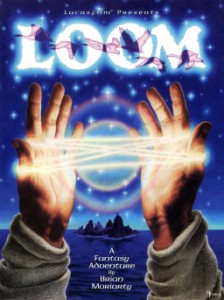392nd played so far
 Genre: Adventure
Genre: Adventure
Platform: Various
Year of Release: 1991
Developer: Lucasfilm Games
Publisher: Lucasfilm Games
Loom has been on my radar for quite a while. As a Lucasarts game, it should be something I’d want to play after the likes of The Secret of Monkey Island or Sam & Max Hit the Road. It’s got a more serious bend and otherwise is unconventional (in ways better discussed in the meat of today’s post), but it still feels like a gap.
Because of that, I have been looking forward to playing this game since the start of the blog, as I’d have a good reason to. It took a while – we have been focusing on some others – but now we finally got around to doing it. A good new adventure.
Our Thoughts
That was an amazing experience. While not entirely without flaws, especially when it comes to length, it takes you on a fascinating journey through a fantasy world.
Playing as Bobbin Threadbare, you are part of the guild of weavers, living on their island, who controls or manipulates the world through their weaving of the pattern of the world. After the members of the guild are transformed into swans as punishment, Bobbin sets out into the world to find them and figure out what happened to them. As he does so, he travels to the realms of other guilds – glassmakers, shepherds and blacksmiths – discovering some of their secrets and rescuing some of them. You even get to defeat a dragon.
A large part of this feeling comes from the interface. Unlike contemporary adventures, which used keywords or text input to enter commands, the mouse control is limited to walking somewhere and looking at it. Instead, any other actions are done by casting spells. You do this by playing (short four note) songs on your distaff. Progress here is limited in two ways – first, you slowly unlock more notes as you get to later points in the game. Second, you need to learn the songs, which you do during the game. It doesn’t prompt you – you have to write down the sequence of notes yourself – but that’s a small burden if you’re prepared. Harder difficulties give you less hints here, removing the notes and forcing you play by ear.
Although it’s little more than unlocking the keywords in a game’s command bar one by one, it adds a lot more flavour to the game. At the same time, it also allows the game a lot more flexibility. While a spell for open (and close – you reverse a spell by playing it backwards) give you access to something fairly standard in most games, that spell can be used in less typical ways as well – such as opening the heavens. Others are more magical, such as a spell to turn straw into gold or one that sharpens (or blunts) objects.
Some spells are optional, giving you access to alternative ways to solve an issue or giving you extra scenes. For example, in the glassmakers guild, being able to fill a chalice gives you some additional exposition.
The system means you get access to a lot of spells – although not entirely true, it feels as if some only need to be used once or twice in the entire game. One advantage that the game gives is how small the playable area is each time. Restricted to (usually) only about five or six screens at a time, they usually have some pretty clear goals, restricted to one or two things to accomplish. There’s no backtracking – with one obvious story exception, no going back to the start of the game to use a spell you picked up near the end. It keeps the game solvable and your options minimal, without providing many distractions. It makes the game easier to solve, even if you were curious what you could have done with some of them earlier.
If there’s one downside this leads to, it’s the game’s brevity. It probably took us about two hours to finish the game, and while some sections were tricky, none really stumped us. There are just not enough options, and with no inventory puzzle, there aren’t too many other things to try. Beyond that, it feels like there’s more to the world than we’ve seen. Word is that there was meant to be a sequel that would explore that further, but due to a change in priorities this never happened. It’s a shame, really, but some kindred Lucasarts titles are yet to come up – perhaps The Dig may give us another glimpse of this type of world.
Final Thoughts
The nice thing about a game like Loom is that we were easily able to rattle it off in an afternoon with the help of a pen and paper (no way we would be able to remember all the spells off by heart as we played to be honest). I enjoyed it in a similar way that I found enjoyment in The Path or Spider: The Secret of Bryce Manor it’s a game where the idea behind it really comes out of the left field. It is a real pity that we never got to see the sequel because it was left wide open with a bizarre (and rather fitting) ending.